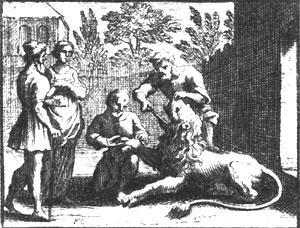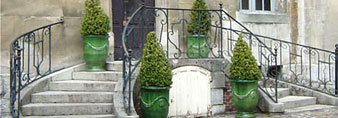THE LION IN LOVE (IV,3)
To Mademoiselle de Sévigné.
Sévigné, so blooming fair !
Whose charms the Graces might adorn,
Except that cold indifferent air
With all their wond'rous beauty born,
Deign me the favour of your ear;
Let no alarm your bosom move,
While you this harmless story hear
Of lion vanquished by love.
Love is a tyrant o'er the heart
Happy they pass their lives away,
Who only know what those impart
Who are the victims of his sway ;
To you, perhaps, no welcome lay.
Though I the fact may not unfold,
At least a Fable may be told :
This therefore I present to you,
From grateful zeal so justly due.
In days of old, when beasts could speak,
Lions with others came to seek
Society with human race,
And gain our fair to their embrace.
Why not ? their race then equalled ours
In courage, strength, and reason's powers.
They had besides a flowing mane ;
But let me here the tale explain.
A lion of great parents born,
Passing a certain mead one morn,
A pretty peasant maiden spied,
And asked to have her for his bride.
The sire with dread the lion saw,
And wished a milder son-in-law
He was embarrassed how to choose ;
’Twas hard to grant, and dangerous to refuse ;
Because one might some morning see
A marriage made clandestinely.
The maid liked men with martial air,
And doted on his shaggy hair.
The father soon did this discover,
And dared not send away her lover,
So mildly to the suitor said :
“ My daughter's delicately made,
And you might hurt her with your paws ;
File down your teeth, and pare your claws ;
And she, it cannot be gainsaid,
Will take your kisses with less fright,
And give you hers with more delight.”
The willing lion soon lay down ;
They pared his claws, his teeth they filed.
So easily is love beguiled !
He looked like a dismantled town.
Dogs ware let loose on him amain,
And his resistance was in vain.
0 love ! 0 love ! when held by you,
To prudence we may say adieu!

Illustr. François Chauveau
(the first illustrator) |
|
|
THE SHEPHERD AND THE SEA
(IV, 2)
Upon the borders of the raging main,
On sober profits lived a happy swain ;
For though his fortune was but small,
In safety still he held all.
Riches at last were cast upon the shore,
He saw and coveted the tempting store ;
Sold off his flocks, and sent his cash to sea.
The ship was wrecked, and gave it the deep ;
The master was reduced to watch the sheep,
Nor longer swain of his own flocks was he.
He who was Corydon before,
Was Roger now, and nothing more.
Soon after, from the profits of the heath,
Having some sheep again at his command,
One day when Boreas holding in his breath
Let the brave ships come smoothly to the land :
“ 0 Madame Sea ! you're come for cash again, ”
He cried ; “ but try some other stupid swain,
For we'll keep ours upon the faithful plain.”
The moral of this tale has gravest scope,—
To hold you to your places here below ;
For truth and sound experience will show,
A pound in hand's worth five in hope.
Deaf to all counsels let us ever be,
Of mad ambition, or the faithless sea.
One they give joy, and twenty thousand care ;
They promise wonders, but beware,
For thieves and storms are frequent there. |
|
|
THE FLY AND ANT (IV, 3) The Ant and Fly disputed rank one day :
“ 0 Jupiter ! ” the latter cried,
“ Shall self-conceit such ignorance display ?
Shall that vile creeping reptile, filled with pride,
In such insulting manner dare
To vie with me, a daughter of the air ?
I live in palaces, and feast with kings ;
Slay they an ox, an offering to thy will,
I taste of that before thee still‑
While this poor wretch lives, silliest of things,
On an oat-straw dragged home with long delay.
But come, my little one, and tell me, pray,
Dost ever camp on monarchs’ heads at ease ?
Or sport in lovely ladies’ locks the day ?
I do ; and kiss fair bosoms when. I please,
As patch I oft enhance their natural graces,
Show better off the whiteness of their faces ;
Through me they strike the final blow,
When they intent on conquering cruises go.”
“You've done, I hope,” replied the Ant ;
“ You live in palaces, I grant,
But chased out every moment too,
So great is their esteem for you.
You taste the first an offering for the sky ;
Is it the better, pray, for that, Miss Fly ?
You enter everywhere, good dame ?
All vile intruders do the same.
You camp on heads of kings—of asses too,
And death in consequence is nothing new.
Some black, you say, sets off the fair white face,
But I am black as you, if black brings grace.
They call it patch ; is that the reason why
You rate your merits now so very high ?
Are there not certain flies called parasites ?
A name in which your vanity delights.
Let not your paeans be so loudly sung,
Court flies are chased away and spies are hung.
You're sure to die of misery or cold,
When Phoebus gives to other fields his gold.
While I shall reap the fruit of all my pain
Nor forced o'er hill and dale to go,
Exposed to rain, and frost, and snow ;
I shall be happy on my native plain.
Then learn, vain thing ! from what I say,
False glory blooms but not decay.
Trifler, adieu! I must away.
It is not thus by chattering in the sun
I store my barns till dreary winter's done. |
THE GARDENER AND HIS LORD (IV, 4)
There lived a man whose whole delight
Was in his village-garden placed,
Who, neither cit nor rustic quite,
His field and garden kept with taste.
The spot was snugly hedged around ;
There lettuces and sorrel grew,
No Spanish jasmine but wild thyme was found,
Nosegays for Margery's birthday too.
Yet was his bliss so pestered by a hare,
That to his lord the man complained and said :
“ The cursed beast comes here to take his share,
At night and morn ; of snares is not afraid ;
A wizard he, I think, for sticks and stones
Are labour lost upon that devil's bones. ”
“ That hare a wizard ! ” his lord answered quick ;
“ Cæsar shall catch him spite of every trick :
I’ll do his business, or my life shall pay. ”
“ But when ? ”—“ To-morrow, without more delay.”
Things thus arranged, the lord came with his train,
“ Ho ! breakfast,” cried he ; “ are your pullets tender ?
Landlord, your daughter, hither quickly send lier.
When shall we wed her ? who's the happy swain ?
My man, it is expensive, you'll not flag,
You take me ? You must ope your money-bag ! ”
He said, sought her acquaintance, was too free,
Seated her by him, almost on his knee ;
He pressed her hand, her arm, and rudely gazed,
And even a corner of her kerchief raised.
The fair resisted, but with looks so kind,
It raised suspicion in the father's mind.
Meantime there's mighty bustling for the cook.
“ How old your hams ? exceeding nice they look, ”
“My lord, they're yours.” “ Indeed ! good man, ” he cries;
“ I take them, ” in most thankful wise.
He breakfasts then his fil, with all his train,
Dogs, horses, valets, the best teeth could boast ;
Then he takes liberties and rules the host,
Drinks all his wine, and clips the maid again.
The noisy bustle for the chase succeeds ;
They all get ready, and they mount their steeds ;
The horns and trumpets with such clamour sound,
The gardener stands astonied on the ground !
But what was worse, that fatal chase
Soon changed the kitchen-garden's face ;
To beds and borders now adieu,
Carrots, and looks, and turnips too !
Beneath a master-cabbage lay the hare;
They scented him, and soon he started there,
Fled through a hole—a gap I should have said,
By order of his lordship made ;
So the poor hedge was open laid ;
For sad had been the jovial crew,
Had they not ail gone mounted through.
“ You sport like princes, ” now the good man. cried.
They left him muttering, and away they hied,
Helter-skelter, man and hound,
Making more havoc, as he rightly fears,
Than all the hares the country round
Could have committed in a hundred years.
Weak princes, settle your disputes at home ;
Fools, if you call on kings to end your jars,
Never invite them to your little wars,
Nor let them on your territories come. |
|



